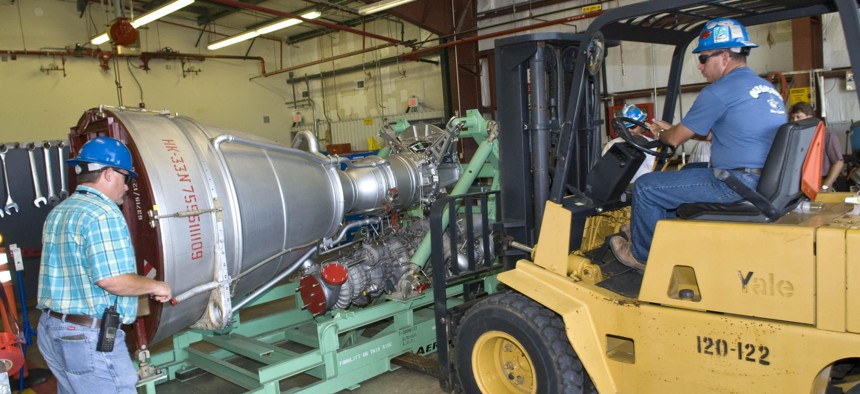
An Aerojet AJ26 rocket engine was delivered to NASA's John C. Stennis Space Center on July 15, 2010. This is the first of a series of Taurus II engines to be tested at Stennis to include acceptance testing of flight engines. NASA
Lockheed’s Proposed Aerojet Rocketdyne Purchase Sets Early M&A Test for Biden
The new administration will weigh in on a further consolidation of the U.S. defense industry.
The Biden administration’s approval — or disapproval — of Lockheed Martin’s planned $4.4 billion acquisition of rocket engine maker Aerojet Rocketdyne could shape defense industry consolidation for years to come.
If approved, the deal would mean the absorption of the last independent American weapons-grade rocket maker. All U.S. rockets would be produced by Northrop, which bought Orbital ATK in 2018, and Lockheed, the world’s largest defense contractor. It would also turn Lockheed into a key supplier of Raytheon Technologies, its major rival in the missiles sector.
Lockheed executives told investors on a Monday morning call that the acquisition would allow the company to deliver weapons to the military faster and cheaper than it can today.
“This helps position us for even greater growth, in hypersonics, missile defense and space, which are key elements of the national defense strategy,” Lockheed CEO Jim Taiclet said.
Taiclet, who became Lockheed’s CEO in June, also cited flat U.S. defense spending projections as a reason for the sale.
“They're going to be asked to do more in these areas with a flattening budget,” Taiclet said. “Having a more efficient supplier and a more robust supplier ... in uncertain economic times is a positive for the Department of Defense and for NASA.”
The proposed deal — which is expected to close in late 2021 — comes two years after Northrop Grumman acquired rocket maker Orbital ATK, a deal stoked industry consolidation fears. The Federal Trade Commission put conditions on the deal that Northrop had to supply solid rocket motors to competitors.
“Our overall expectation is that that may be the same lens through which this particular transaction is viewed because of the similarities there,” Taiclet said.
Still, Boeing claimed Northrop’s buying Orbital ATK prevented it from entering a bid for an $85 billion contract to build new intercontinental ballistic missiles. That left Northrop as the only bidder.
Orbital ATK, now part of Northrop, and Aerojet Rocketdyne are the only two U.S. makers of the solid rocket motors used in ICBMs and missile interceptors.
“The proposed purchase of Aerojet Rocketdyne (AJRD) by Lockheed Martin (LMT) is the first test of the Biden Administration and its views on defense sector consolidation and structure,” Capital Alpha Partners analyst Byron Callan said in a Monday note to clients. “It may take weeks and months before those views are known.”
Loren Thompson, a consultant and defense industry analyst with the Lexington Institute, said Lockheed’s acquisition of Aerojet would create more competition for solid rocket motors.
“Aerojet Rocketdyne will now have the same kind of financial resources to draw on as Orbital did when it joined Northrop, assuring that both domestic suppliers of large solids can remain active in military and civilian markets,” Thompson wrote Monday in Forbes.
A number of government organizations — including the Defense Department — are involved in the regulatory approval process. When Lockheed acquired helicopter-maker Sikorsky in 2015, Frank Kendall, who served as the Pentagon’s top weapons buyer during the Obama administration, expressed concerns that the deal would reduce competition. Kendall is reportedly under consideration to become Biden’s deputy defense secretary.
“Raytheon and Boeing may see the LMT-AJRD deal as a competitive threat, but we don’t yet know if this is true and, if so, how hard they will push DoD and other Justice or FTC on this issue,” Callan wrote.
Taiclet, on the call with investors Monday, said Lockheed and its outside advisors believe the acquisition of Aerojet Rocketdyne would not raise “traditional antitrust” issues since the companies do not have overlapping businesses.
“Having the engineers as part of the same organization as they design integrated propulsion and overall system product, I think is going to make Lockheed Martin, especially Missiles and Fire Control and space units, much more effective,” Taiclet said. “We'll also be faster to market, we'll also be more efficient, if you will, in other words, less expensive to the end customer to deliver that product. So I think on all the key areas of cost, schedule and quality, we're going to be a better operator and a better supplier for our customer base.”







